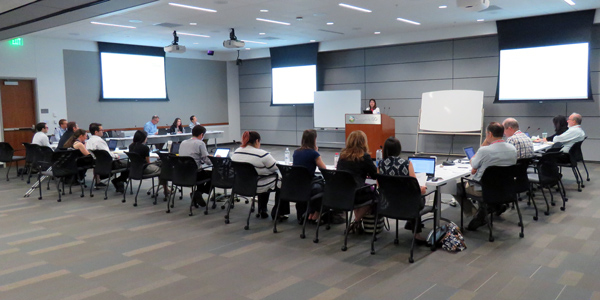By Jason Fordney
FOLSOM, Calif. — CAISO is refining market rule changes to more accurately reflect suppliers’ costs of producing and dispatching electricity while also increasing their bidding flexibility.
Stakeholders attending an Aug. 3 workshop learned more about recent proposed changes to bidding rules in the ISO’s Commitment Cost and Default Energy Bid Enhancements (CCDEBE) initiative. Energy suppliers say that even with improvements over the past decade, they don’t have the bidding flexibility they need to reflect all costs under all conditions.
Based on feedback from market participants, CAISO has acknowledged that its current bidding rules need more flexibility and do not always reflect certain costs, price volatility and “business needs.” The rule changes are also designed to incentivize flexible resources that help manage renewable generation when fuel supplies are tight and reduce the risk of not recovering costs for gas and non-gas resource operators.
CAISO is the only organized wholesale electricity market in the U.S. that does not currently support market-based commitment cost bids subject to mitigation, said Cathleen Colbert, senior market design and policy developer at the ISO.
“We wanted to put this out, to get the conversation started and to get feedback,” she said at the workshop, where she presented details of the proposal.
Market rules must allow suppliers to submit economic prices based on costs and risk while protecting themselves from structural issues in the market, the ISO said. Mitigated prices must reasonably reflect suppliers’ expectations of their costs.
CAISO mitigates market-based commitment costs using the “three pivotal supplier” test, which checks for market power by measuring the degree to which a given market relies on just three suppliers — rather than drawing on excess generation from other suppliers — to meet demand. Commitment costs refer to the portion of the supply offer that involves start-up, transition and maintaining minimum load requirements. Suppliers can submit either market-based energy offers or cost-based commitment cost offers. Cost-based offers are subject to a cap that provides only limited flexibility, CAISO said, while market-based energy offers have a $1,000/MWh cap and are mitigated when uncompetitive conditions are found.
The CCDEBE program is one of a series of ongoing market updates CAISO is working on to deal with changing conditions on the grid and public policy goals. The ISO plans to end certain temporary measures in a separate proceeding on Aliso Canyon gas-electric coordination when the CCDEBE procedures are implemented. (See CAISO Board Approves Aliso Canyon Rules Package.)
The ISO is additionally working to comply with FERC Order 831, which requires that supplier costs are reflected when energy bids rise above $1,000/MWh. (See New FERC Rule Will Double RTO Offer Caps.) The federal rule was put in place last November after wholesale power prices spiked during the winter storms of 2013-2014 and generators said they could not recover their costs.
The system operator posted its revised CCDEBE proposal on Aug. 2, with comments due Aug. 7. The package is due to go the Western Energy Imbalance Market (EIM) Governing Body for an advisory vote on Oct. 10 and to the CAISO Board of Governors for approval on Nov. 1.
“People are very eager for us to get this in place a quick as we can in 2018,” CAISO Market Design Manager Brad Cooper said. “Our timeline is very tight.”





